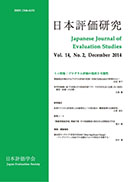Volume 14, Issue 2
Displaying 1-5 of 5 articles from this issue
- |<
- <
- 1
- >
- >|
Special Issue: Current state and future prospects of program evaluation
-
2014Volume 14Issue 2 Pages 1-16
Published: December 26, 2014
Released on J-STAGE: June 01, 2023
Download PDF (588K) -
2014Volume 14Issue 2 Pages 17-28
Published: December 26, 2014
Released on J-STAGE: June 01, 2023
Download PDF (550K)
Article
-
2014Volume 14Issue 2 Pages 29-41
Published: December 26, 2014
Released on J-STAGE: June 01, 2023
Download PDF (713K)
Research note
-
2014Volume 14Issue 2 Pages 43-59
Published: December 26, 2014
Released on J-STAGE: June 01, 2023
Download PDF (1273K)
Report
-
2014Volume 14Issue 2 Pages 61-77
Published: December 26, 2014
Released on J-STAGE: June 01, 2023
Download PDF (758K)
- |<
- <
- 1
- >
- >|
